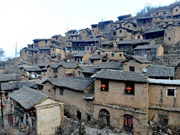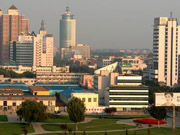4. Advancing agricultural modernization and rural reform and development
Agriculture is important for expanding domestic demand and making structural adjustment, and it is a sector vital for ensuring China's stability and maintaining public confidence. We must make doing a good job in our work relating to agriculture, rural areas, and farmers the number one priority in all our endeavors and accelerate agricultural modernization in order to ensure China's food security and increase farmers' incomes.
We will make sure that China's cultivated land area does not fall below the red line of 120 million hectares. We will improve the quality of cultivated land, increase overall agricultural production capacity, and guarantee our basic self-sufficiency of cereal grains and absolute grain security. In this way, we will have full control over the food supply of China's 1.3 billion people.
We will strengthen policies for supporting and protecting agriculture.
We will raise the minimum purchase prices of wheat and rice, and continue to implement the policy on purchasing and stockpiling corn, canola seeds and sugar on an ad hoc basis. We will consider the introduction of a system of guaranteed base prices for agricultural products, under which subsidies will be given to producers when market prices are too low and to low-income consumers when market prices are too high.
Increases in agricultural subsidies will be mainly provided to support the production of grain and other major agricultural products, new types of agricultural businesses and major agricultural regions. More rewards and subsidies will be given to major counties that produce grain, canola seed or hogs, and support will also be provided for beef and mutton production.
We will improve the subsoil of farmland to promote the increase in agricultural output, and carry out a trial this year on 6.67 million hectares of farmland. Funds for agricultural development will be merged and allocated in a coordinated way. Even though our financial resources are strained, we must ensure that spending on agriculture always increases.
We will strengthen the foundation of agricultural and rural development.
Investment will be concentrated on building a number of major water conservancy projects. Over 70 billion yuan will be allocated from the central government budget this year to fund major projects to divert water, protect key water sources, harness rivers and lakes, and develop efficient water-saving irrigation. All local governments need to give higher priority to building small and medium-sized water conservancy projects and solve the "last-kilometer" problem of farmland not being connected with main irrigation channels.
Efforts will be sped up to increase the acreage of high-standard farmland that produces good yields in times of drought or excessive rain. We will work harder to breed important superior crop varieties, and develop and extend the use of new types of efficient agricultural machinery. We will improve rural infrastructure such as roads, telecommunications services, and water, electricity and methane supply. A total of 2.6 million rundown rural houses will be rebuilt and 200,000 kilometers of rural roads will be upgraded.
We will give high priority to resolving problems facing children, women and older people who are left behind in rural villages by rural migrant workers working in cities. Safe drinking water will be made available to another 60 million rural residents. Through hard work this year and next, we must provide safe drinking water to all rural residents.
We will vigorously push forward rural reform.
We will adhere to and improve the basic rural management system and grant farmers more property rights. We will ensure that rural land contract relations will long remain unchanged, and promptly determine, register and certify the rights to contracted use of land and the use of collective land for construction purposes in rural areas. We will guide the orderly transfer of contracted land-use rights and prudently carry out trials to reform the rural land system. We will maintain household operations as the basis; cultivate new types of agricultural businesses, such as large and specialized family businesses, family farms, farmer cooperatives, and agribusinesses; and develop large-scale agricultural businesses of various types. We will train a new type of professional farmers.
We will improve tenure reform for collective forests and accelerate the reform of state-owned farms, grazing land and forestry farms. We will improve commercial agricultural services and carry out trials of comprehensive reform of rural supply and marketing cooperatives. In carrying out rural reform, we need to base ourselves on actual conditions, conduct trials first, fully respect farmers' wishes, and steadfastly protect their legitimate rights and interests.
We will explore new ways to alleviate poverty through development.
We will move faster to promote development of contiguous poor areas and reduce poverty there. The central government will increase support for major trans-regional infrastructure projects and economic coordination, strengthen ecological preservation and improve public services. Local governments need to merge poverty alleviation resources to make better use of them and take targeted measures to ensure that assistance reaches poverty-stricken villages and households. We will guide nongovernmental forces to participate in poverty alleviation. This year, we will lift more than ten million people out of poverty. We will continue to fight poverty and prevent poverty from being passed to future generations.
5. Carrying out a new type of people-centered urbanization
Urbanization is the sure route to modernization and an important basis for integrating the urban and rural structures. We must improve the system and mechanisms for integrating rural and urban development and embark on a new path of urbanization. This new type of urbanization should have the following features: putting people first; integrating the development of industrialization, IT application, urbanization and agricultural modernization; improving the spatial layout; protecting the ecological environment; and carrying forward Chinese culture.
We must follow the natural law concerning urbanization, carry it out actively and prudently, and work harder to raise its quality. For some time to come, we will focus on three tasks, each concerning 100 million people: granting urban residency to around 100 million rural people who have moved to cities, rebuilding rundown city areas and villages inside cities where around 100 million people live, and guiding the urbanization of around 100 million rural residents of the central and western regions in cities there.
We will grant urban residency in an orderly manner to rural people who have moved to cities.
We will reform the household registration system, and implement a household registration policy with different eligibility requirements for people of different conditions, and progressively grant urban residency to rural migrant workers and their families who are both willing and able to stay in cities and towns where they have had jobs or done business for a long time. We will introduce a residence permit system for rural people in urban areas who have not yet gained urban residency.
More children of rural migrant workers living with their parents in cities will be entitled to go to school there, including secondary school and college, and we will provide vocational skills training to rural migrant workers. We will steadily extend basic public services to fully cover the permanent population of cities and towns so that the rural people who live in them can contribute to the development of modern urban life and enjoy it together with the urban people.
We will increase support for a new type of urbanization in the central and western regions.
We will help their industries develop and attract people and encourage rural migrant workers in the two regions to find employment in local cities and towns. We will speed up development of infrastructure including transportation, water conservancy, energy and municipal services in the two regions and make development of city clusters and towns there more sustainable. We will also improve the structure of cities and towns in the eastern region and raise the quality and standard of urbanization there.
We will strengthen management innovation and institutional development pertaining to urbanization.
We will expand the rebuilding of rundown urban areas so that cities will take on a new look instead of having stretches of rundown areas existing side by side with high-rise buildings. We will make plans for urbanization in a coordinated way in accordance with the national guidelines for developing a new type of urbanization. We will use urban construction land more efficiently, give high priority to developing public transport, protect sites of historical and cultural interest and natural landscapes, and avoid making cities and towns all look the same.
We will strengthen planning management of villages and small towns. We will explore ways to share costs associated with granting urban residency to rural people who have moved to cities and diversify investment and financing for urban development. We will better develop and manage cities and towns so that they are livable and have unique features, good working conditions and more vitality.
6. Using innovation to support and lead economic structural improvement and upgrading
Innovation is the motive force for adjusting and upgrading the economic structure. We need to make innovation the core of China's development endeavors, promote the full integration of science and technology with economic and social development, and elevate China's industries to the high range of the global value chain.
We will accelerate reform of the science and technology management system.
We will strengthen the leading role businesses play in making technological innovation, encourage enterprises to set up research institutes, take the lead in establishing industry-academia-research collaboration in making innovation, and comprehensively implement preferential policies such as extra deductions for businesses' R&D expenses. More science parks and scientific and educational institutions will be covered by the trial reform policy that gives national innovation demonstration zones equity-based incentives for making innovation and the right to transfer and profit from their scientific and technological advances.
We will increase government spending on basic research and research on cutting-edge technologies, technologies for the public good and key standard technologies, and we will improve public science and technology service platforms and the mechanism for launching major science and technology programs.
We will improve and strengthen the management of research projects and their funding, introduce the system of national innovation surveying and science and technology reporting, and encourage researchers and engineers to set up businesses.
The protection and use of intellectual property rights will be strengthened. We will work to propagate scientific knowledge and foster a scientific spirit. We will fully implement the talent development plan, coordinate major programs for nurturing and attracting talent, and encourage the establishment of a mechanism to link researchers' pay with the market value of their research so that researchers' contributions are matched by their rewards. This will enable outstanding individuals of various types to come forth in large numbers, and their talent will be fully unleashed.
In making industrial structural adjustment, we will rely on reform and support growth in some sectors while curbing excess and outdated production capacity in others.
We will support growth more vigorously. We will give high priority to developing production-oriented service industries, and carry out pilot and demonstration projects to advance the comprehensive reform of the service industry. We will integrate the development of cultural and creative industries as well as design services with related industries, and speed up the development of insurance, business, and science and technology services.
We will promote full integration of IT application with industrialization, encourage businesses to accelerate technological upgrading, make management more precise, improve the policy for accelerating equipment depreciation, and make traditional industries more competitive. We will build a platform for supporting business startups and innovation in emerging industries.
We will strive to catch up with and overtake advanced countries in areas of new-generation mobile communications, integrated circuits, big data, advanced manufacturing, new energy and new materials, and to guide the development of emerging industries. We will curb excess and outdated production capacity in a more proactive and orderly manner. We will let market competition determine which businesses survive, and encourage business acquisitions and reorganizations.
In industries with severe overcapacity, we will strengthen environmental protection, energy consumption, and technology standards; abolish preferential policies; absorb some excess production capacity and strictly control increases in production capacity. This year, we will reduce outdated production capacity of 27 million metric tons of steel, 42 million metric tons of cement and 35 million standard containers of plate glass. We will ensure that the target for reducing outdated production capacity set in the Twelfth Five-Year Plan is met one year ahead of schedule, and make sure that these reductions are permanent and such production capacity does not increase again.
 |  |

 800-year-old ancient village in Shanxi
800-year-old ancient village in Shanxi A glimpse of China's Zhongshan station in Antarctica
A glimpse of China's Zhongshan station in Antarctica Female marines receive tactical training in NW China
Female marines receive tactical training in NW China Shanghai women fall in love with Aerial Yoga
Shanghai women fall in love with Aerial Yoga This is Beijing – Nanluoguxiang
This is Beijing – Nanluoguxiang Old photos of Anti-Japanese War (1937-1945)
Old photos of Anti-Japanese War (1937-1945) Top 10 cities for falling house prices in January
Top 10 cities for falling house prices in January Top 10 richest real estate tycoons: Hurun
Top 10 richest real estate tycoons: Hurun Large numbers of ancient coins excavated in Inner Mongolia
Large numbers of ancient coins excavated in Inner Mongolia British WWII veteran: I can't forgive Japan
British WWII veteran: I can't forgive Japan Top 10 brands that win rich women's hearts
Top 10 brands that win rich women's hearts Memorizing the Flying Tigers
Memorizing the Flying Tigers The Chinese Dream: the Chinese Spirit and the Chinese Way
The Chinese Dream: the Chinese Spirit and the Chinese Way
Day|Week|Month